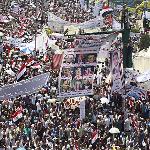July 08, 2011

Photo: AP
Egyptians crowd at Tahrir Square in Cairo, the focal point of the uprising, to demand justice for victims of Hosni Mubarak's regime and press the new, military rulers for a clear plan of transition to democracy, July 8, 2011
Tens of thousands of Egyptians gathered Friday in Cairo's Tahrir Square and several other towns to call for faster reforms and to protest this week's jail release of police officers and former government ministers. These were among the largest demonstrations since the 18-day revolution in January and February.
One group of protesters chanted for retaliation against former regime members and police officers who attacked protesters in January and February. But mostly it was a festive crowd, complete with a football-field-length Egyptian flag, tee shirt and hat salesmen and children with Egyptian flags painted on their faces.
"We are here today to continue our revolution," said Ahmed Ali. Ali is a young worker who restores ancient monuments and says he has been at many of the Tahrir Square protests. "The killers are free now, out of jail. They killed our children. They killed our brothers. They killed our fathers. Show us justice!"
Ali and others on the square say they came out to protest the acquittal and release of ministers from the former government who had been accused of corruption, and the decision to grant bail to police officers accused of killing protesters in the town of Suez in January.
Dr. Nagham Omar says people like herself who want real reform cannot simply expect the interim government to deliver it.
OMAR: "The revolution started two months ago or three months ago but it didn't finish. We are the ones who did it so we must care for it until the end.
PESSIN: "What do you hope will be the result of today's event?"
OMAR: "Today? Nothing will come out. But we must push."

VOA Photo A. Pessin
Former Egyptian Foreign Minister Amr Moussa in Cairo, Egypt's Tahrir Square, July 8, 2011Former Egyptian Foreign Minister Amr Moussa, who just stepped down as secretary general of the Arab League, made a brief visit to the square.
Moussa, who is expected to run for the Egyptian presidency, told VOA such protests are needed to ensure the revolution will succeed in the long run.
"I'm so proud to be among the people and to be received with enthusiasm by the people," Moussa said. "And we want change, and we want to move on. We want to have prosperity, stability, democracy and the voice of the people."
At least one woman on the square had a particularly personal reason to be there. Arzak Abdel Halim's son Ahmed was killed during the January protests. She came out Friday with her two young daughters, and spoke through the veil of her black abaya, decorated with an Egyptian-flag headband. She says people started to change after the revolution, to be closer to God and perhaps to achieve freedom.
Another veiled woman, who identified herself only as Basma, said she was there for justice. "We want to be like Switzerland. We want to be like Europe," Basma said. "We got tired of despotism. We will not get Egypt on a silver platter, but after lots of hard work, we will achieve that."
On a plastic chair at a make-shift tea shop in the middle of Tahrir Square, a long-time critic and three-time prisoner of the former regime, Professor Saad Eddin Ibrahim, couldn't suppress a smile as he looked around him. Ibrahim said protests like this one fulfill his lifelong dream of real "people power" in Egypt.
"It is needed to remind all concerned that the revolutionary spirit is still high, and people are still determined to see concrete measures of change," Ibrahim noted.
Professor Ibrahim says Friday's protest was particularly noteworthy because poor people came, and people from the countryside, who, he said, at first saw the revolution as an elitist movement.
Office worker Zakariya Ahmed came with his wife, and held his young daughter in his arms. He said he wants to teach her to be brave and to defend her country.
"How long should I stay in fear? For how long? We have been suppressed for 30 years. And before that our parents were. So how long should I stay in fear?" Ahmed asked.
Egypt's transitional leaders appear to recognize the depth of feeling in the streets.? On Thursday, 25 former officials, several of them very senior, were charged with manslaughter and attempted murder for allowing an attack on protesters in February, during which officers rode horses and camels. In addition, the Interior Minister promised to fire hundreds of police officers and senior commanders connected with attacks on protesters.